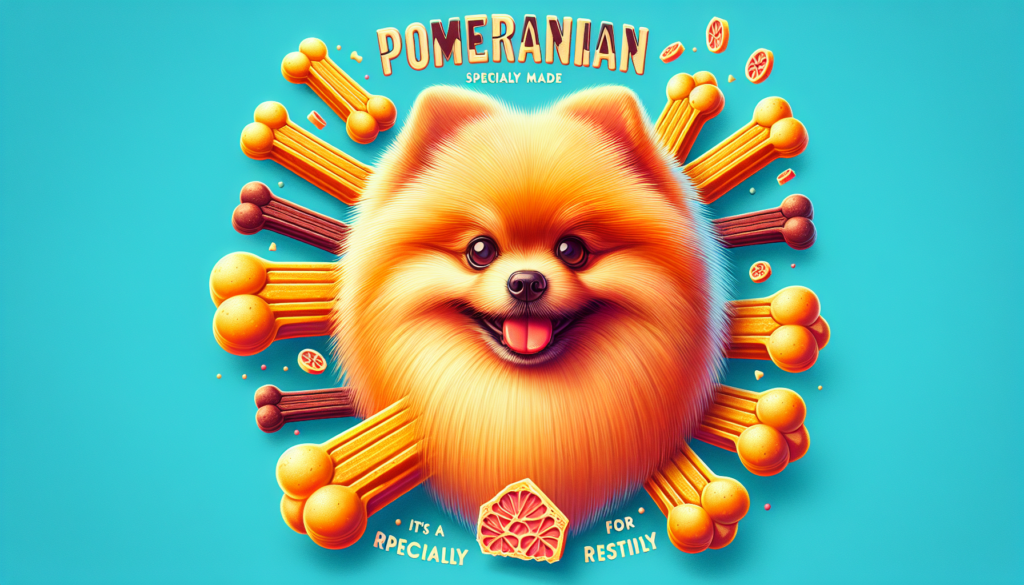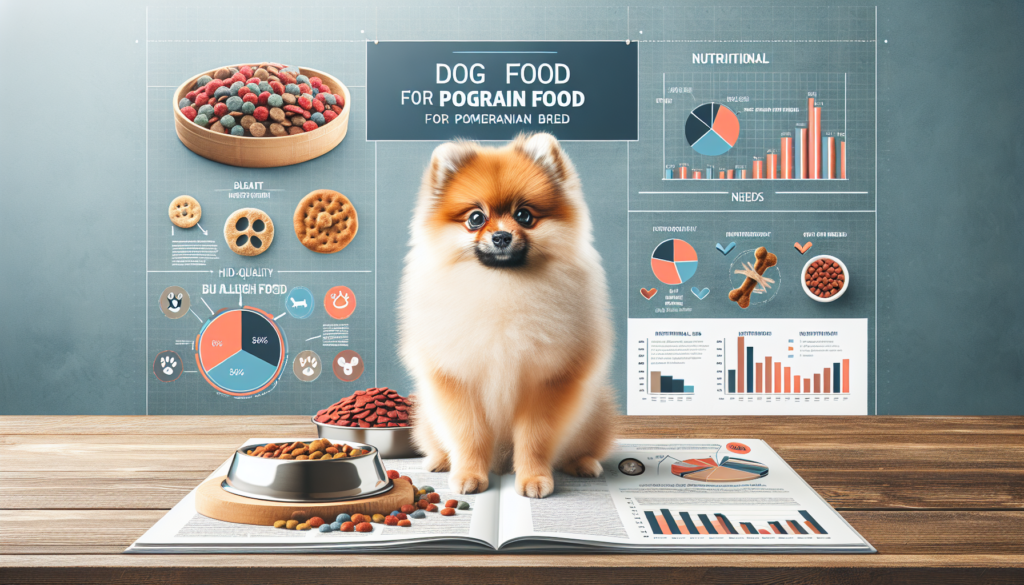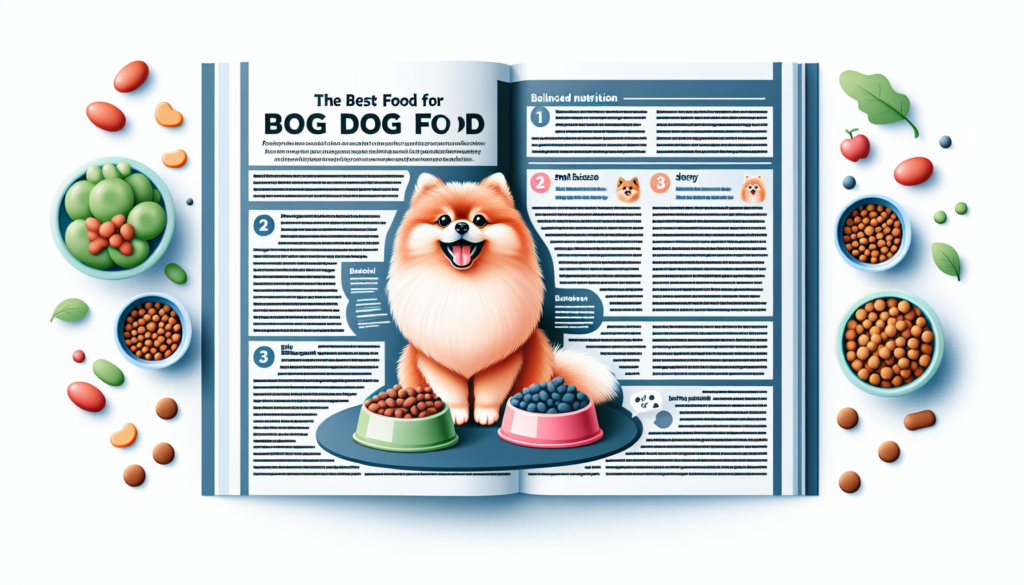Are you a proud Pomeranian owner in search of the best dog food for your furry friend? Look no further! In this article, we will discuss the top dog food options specifically tailored to meet the nutritional needs of Pomeranians. With their unique small size and energetic personality, finding the right food for your Pomeranian can be a daunting task. However, we have done the research for you and compiled a list of nutritious and tasty options that will keep your Pomeranian happy and healthy. So, let’s dive into the world of dog food and find the perfect match for your beloved Pomeranian!
Factors to Consider When Choosing Dog Food for Pomeranian Breeds
Pomeranian Breed-Specific Needs
When choosing dog food for your Pomeranian, it is important to consider the specific needs of this breed. Pomeranians are small dogs with high energy levels, so their diet should provide them with the necessary nutrients to support their metabolism and keep them active and healthy. Additionally, Pomeranians have a thick double coat that requires proper nutrition to keep it in optimal condition.
Age and Life Stage
Another crucial factor to consider when selecting dog food for your Pomeranian is their age and life stage. Pomeranian puppies have different nutritional needs than adult or senior Pomeranians. Puppies require a higher level of protein, fat, and calories to support their growth and development. Adult Pomeranians, on the other hand, need a balanced diet to maintain their weight and energy levels. Senior Pomeranians may benefit from a diet that supports joint health and contains ingredients that promote brain function.
Health Conditions and Dietary Restrictions
If your Pomeranian has any health conditions or dietary restrictions, it is essential to choose dog food that caters to their specific needs. Some Pomeranians may have sensitivities to certain ingredients or require a specialized diet due to allergies or medical conditions. Consult with your veterinarian to determine if your Pomeranian has any specific dietary requirements and to identify the best food options for them.
Food Allergies and Sensitivities
Food allergies and sensitivities can cause discomfort and health issues for Pomeranians. Common allergenic ingredients include wheat, corn, soy, and certain protein sources like beef or chicken. If your Pomeranian shows signs of food allergies or sensitivities, such as itching, gastrointestinal issues, or skin problems, consider switching to a hypoallergenic dog food that excludes the allergenic ingredients or opt for limited ingredient diets that minimize the risk of triggering an allergic response.
Budget and Affordability
While it is important to prioritize your Pomeranian’s health and nutrition, it is also essential to consider your budget and the affordability of the dog food you choose. Dog food options vary in price range, but it is crucial to look for high-quality options that meet your Pomeranian’s nutritional needs. Determine your budget and explore different brands and types of dog food that fit within your price range while still providing the necessary nutrients for your Pomeranian.
Types of Dog Food Suitable for Pomeranians
Dry Dog Food
Dry dog food, also known as kibble, is one of the most common types of dog food available. It offers convenience and a longer shelf life compared to other options. Dry dog food is often formulated to meet the nutritional needs of specific breeds or life stages. When choosing dry dog food for your Pomeranian, look for options that contain high-quality protein sources, healthy fats, and a balanced blend of vitamins and minerals.
Canned Dog Food
Canned dog food, also referred to as wet dog food, is another popular choice for Pomeranians. It has a higher moisture content and can be more palatable for picky eaters or Pomeranians with dental issues. Canned dog food often contains higher levels of protein and fewer carbohydrates. When selecting canned dog food for your Pomeranian, ensure that it includes high-quality ingredients and meets their specific nutritional needs.
Raw and Fresh Food
Raw and fresh food diets have gained popularity among dog owners in recent years. These diets typically consist of raw meat, bones, fruits, and vegetables. Advocates of raw feeding believe that it provides dogs with a more natural and biologically appropriate diet. However, it is crucial to consult with a veterinarian before transitioning your Pomeranian to a raw or fresh food diet, as it requires careful planning to ensure a balanced nutritional profile.
Dehydrated and Freeze-Dried Dog Food
Dehydrated and freeze-dried dog food offers a middle ground between raw and traditional dog food options. These types of dog food are minimally processed and retain a higher nutritional value compared to kibble or canned food. Dehydrated and freeze-dried dog food is often made from human-grade ingredients and can be easily rehydrated with water before serving. Consider dehydrated or freeze-dried dog food options if you are looking for a convenient yet nutritious alternative for your Pomeranian.

Key Nutrients for Pomeranian Breeds
Protein
Protein is a vital nutrient for all dogs, including Pomeranians. It helps support muscle mass, tissue repair, and overall growth and development. Look for dog food options that list high-quality protein sources, such as chicken, turkey, fish, or lamb, as the main ingredient. Aim for a minimum protein content of 25% to 30% to ensure your Pomeranian receives an adequate amount.
Healthy Fats
Fat is an excellent source of energy for Pomeranians and plays a crucial role in maintaining healthy skin and a shiny coat. Look for dog food options that contain healthy fats, such as chicken fat, fish oil, or flaxseed oil. These fats also provide essential fatty acids like omega-3 and omega-6, which support overall health and immune function.
Carbohydrates
Carbohydrates provide Pomeranians with energy and can be found in grains, vegetables, and fruits. While some dog owners prefer grain-free options, Pomeranians can generally tolerate, and even benefit from, whole grains like brown rice or oats in moderate amounts. However, it is important to ensure that the dog food you choose contains high-quality carbohydrate sources and does not rely heavily on fillers like corn or wheat.
Vitamins and Minerals
Vitamins and minerals are essential for maintaining a Pomeranian’s overall health and well-being. Look for dog food that includes a wide range of vitamins and minerals, such as vitamin A, vitamin C, vitamin E, B vitamins, calcium, phosphorus, and zinc. These nutrients support various bodily functions, including immune system health, bone growth, and skin and coat health.
Omega-3 Fatty Acids
Omega-3 fatty acids, such as those found in fish oil, have numerous health benefits for Pomeranians. They help reduce inflammation, support brain function, and promote healthy skin and coat. Look for dog food options that include a good source of omega-3 fatty acids to ensure your Pomeranian receives these essential nutrients.
Recommended Brands for Pomeranian Breeds
Royal Canin Breed Health Nutrition
Royal Canin has a range of breed-specific dog food options, including formulations designed specifically for Pomeranians. Their formulas take into account the unique needs and characteristics of each breed, providing customized nutrition. Royal Canin Breed Health Nutrition offers a range of kibble options that cater to different Pomeranian life stages, sizes, and specific health concerns.
Hill’s Science Diet
Hill’s Science Diet is a well-known and trusted brand in the dog food industry. They offer a variety of formulas suitable for Pomeranians, including options for puppies, adult dogs, and senior dogs. Hill’s Science Diet dog food is formulated with high-quality ingredients and backed by years of research and veterinary expertise.
Wellness CORE Grain-Free
Wellness CORE Grain-Free dog food is an excellent option if you prefer to feed your Pomeranian a grain-free diet. It is formulated with high-protein content and focuses on providing balanced nutrition to support your Pomeranian’s overall health and vitality. The grain-free recipes incorporate ingredients like deboned turkey, chicken, or salmon and include a blend of fruits, vegetables, and antioxidants.
Merrick Grain-Free
Merrick Grain-Free dog food is another popular choice for Pomeranians with food sensitivities or those following a grain-free diet. Their formulas contain high-quality protein sources and a variety of fruits and vegetables to provide essential nutrients. Merrick dog food options often feature deboned meat as the main ingredient, ensuring that your Pomeranian receives a high-quality source of protein.
Taste of the Wild
Taste of the Wild offers a range of dog food formulas inspired by the natural diet of dogs’ ancestors. Their grain-free recipes feature high-quality ingredients like roasted venison, bison, or salmon, and are supplemented with fruits, vegetables, and probiotics for optimal digestion. Taste of the Wild provides a variety of flavors and formulations suitable for Pomeranians of all life stages.

Understanding Dog Food Labels
Identifying High-Quality Ingredients
When reading dog food labels, it is important to identify high-quality ingredients. Look for dog food options that list real meat (e.g., chicken, turkey, fish) as the first ingredient. Avoid foods that use generic terms like “meat meal” or “animal by-products” as these may contain lower-quality protein sources. Additionally, look for ingredients that are easily recognizable and pronounceable.
Avoiding Fillers and By-products
Fillers and by-products are ingredients that provide little nutritional value and are often used to bulk up dog food at a lower cost. Corn, wheat, and soy are common fillers that can be difficult for Pomeranians to digest. Avoid dog food options that rely heavily on these ingredients or contain artificial preservatives, colors, or flavors.
Checking for Guaranteed Analysis
The guaranteed analysis on the dog food label provides information about the minimum and maximum levels of certain nutrients in the food. It gives you an idea of the nutrient content and whether it meets your Pomeranian’s dietary needs. Pay attention to the protein, fat, fiber, and moisture content listed in the guaranteed analysis.
Decoding Feeding Guidelines
Feeding guidelines on dog food labels provide recommendations on portion sizes based on your dog’s weight and activity level. However, it is important to remember that these guidelines are just starting points. Factors such as metabolism, age, activity level, and overall health may require adjustments to the recommended servings. Monitor your Pomeranian’s weight and body condition and consult with your veterinarian to determine the appropriate portion sizes.
Tips for Transitioning to a New Dog Food
Gradual Transition Process
When transitioning your Pomeranian to a new dog food, it is important to do so gradually to avoid digestive issues. Start by mixing a small amount of the new food with their current food, gradually increasing the proportion of the new food over several days or weeks. This slow transition allows your Pomeranian’s digestive system to adjust to the new food without causing stomach upset or diarrhea.
Monitoring for Digestive Issues
During the transition period and after introducing the new food, monitor your Pomeranian for any signs of digestive issues, such as vomiting, diarrhea, or excessive gas. If you notice any adverse reactions, it may be necessary to slow down the transition process or consider alternative dog food options. Consulting with your veterinarian can help guide you through the transition and address any concerns.
Adjusting Serving Size
Once your Pomeranian has successfully transitioned to the new dog food, it is important to monitor their weight and body condition. If your Pomeranian starts to gain weight or becomes overweight, you may need to adjust the serving size to ensure they are not overeating. Similarly, if your Pomeranian loses weight or appears underweight, you may need to increase the portion sizes. Regularly monitoring and adjusting the serving size will help maintain your Pomeranian’s optimal weight.

Avoiding Common Food Allergens
Identifying Allergenic Ingredients
To avoid common food allergens, it is important to identify allergenic ingredients that may trigger an allergic response in your Pomeranian. Common allergens include grains like wheat, corn, and soy, as well as specific protein sources like beef, chicken, or dairy. Eliminating these ingredients from your Pomeranian’s diet can help alleviate allergic reactions and promote better overall health.
Introducing Limited Ingredient Diets
Limited ingredient diets are specially formulated to minimize the risk of allergic reactions. These diets typically feature a single, novel protein source and a limited number of easily digestible carbohydrates. By reducing the number of ingredients, limited ingredient diets make it easier to identify and eliminate potential allergens from your Pomeranian’s diet.
Elimination Diets
In some cases, if your Pomeranian’s allergies or sensitivities are persistent and difficult to identify, an elimination diet may be necessary. This involves feeding your Pomeranian a diet consisting of novel protein and carbohydrate sources that they have not previously consumed. After a period of feeding only these new ingredients, you can gradually reintroduce other ingredients one by one to identify any potential allergens.
Home-Cooked and DIY Dog Food Options
Benefits and Considerations
Home-cooked and DIY dog food options allow you to have complete control over the ingredients and quality of your Pomeranian’s meals. This can be beneficial for Pomeranians with specific dietary needs or allergies. However, it is crucial to ensure that the home-cooked meals are nutritionally balanced and provide all the necessary nutrients your Pomeranian needs for optimal health. Consult with a veterinarian or a veterinary nutritionist to create balanced recipes for home-cooked meals.
Balancing Nutritional Requirements
When preparing home-cooked dog food, it is important to balance the nutritional requirements of your Pomeranian. Dogs require specific amounts of protein, fats, carbohydrates, vitamins, and minerals for their overall well-being. Consult with a veterinarian to determine the appropriate ratio of these nutrients and to ensure that your Pomeranian’s meals meet their needs.
Consulting with a Veterinarian
Before switching your Pomeranian to a home-cooked or DIY dog food diet, it is crucial to consult with a veterinarian. They can help you create a nutritionally balanced recipe that considers your Pomeranian’s specific needs and ensure that they are receiving all the essential nutrients. Regular check-ups and monitoring are also important to assess your Pomeranian’s health and make any necessary adjustments to their diet.

Feeding Tips for Pomeranians
Portion Control and Meal Frequency
Pomeranians are a small breed, and overfeeding can lead to weight gain and subsequent health issues. It is important to practice portion control and feed your Pomeranian appropriate-sized meals based on their weight, activity level, and life stage. Split their daily food allowance into two or three meals to avoid overeating and to help maintain stable blood sugar levels.
Avoiding Overfeeding and Obesity
Obesity is a common issue in small dog breeds like Pomeranians. Overfeeding and lack of exercise can contribute to weight gain, which can lead to various health problems. To avoid overfeeding, monitor your Pomeranian’s body condition and adjust their portion sizes accordingly. Limit the number of treats and snacks to avoid excessive calorie intake.
Hydration
Proper hydration is essential for your Pomeranian’s overall health and well-being. Always provide fresh, clean water for your Pomeranian to drink throughout the day. Pay attention to signs of dehydration, such as dry gums or lethargy, and ensure that your Pomeranian has access to water at all times, especially during hot weather or after physical activity.
Supplementing with Treats and Snacks
While treats and snacks can be a great way to reward your Pomeranian or provide additional enrichment, it is important to choose healthy options. Look for treats that are specifically made for small breed dogs and made from high-quality ingredients. Avoid treats that are high in fat or contain artificial additives, preservatives, or fillers. Remember to account for the calorie content of treats when calculating your Pomeranian’s daily intake.
Conclusion
Choosing the right dog food for your Pomeranian is crucial in ensuring their overall health and well-being. Consider their breed-specific needs, age, and life stage, as well as any health conditions or dietary restrictions they may have. Look for dog food that contains essential nutrients like protein, healthy fats, carbohydrates, vitamins, and minerals. Consider reputable brands like Royal Canin, Hill’s Science Diet, Wellness CORE, Merrick, or Taste of the Wild, and always check the ingredients list and guaranteed analysis on the dog food labels. When transitioning to a new dog food, do it gradually and monitor your Pomeranian for any digestive issues. Avoid common allergenic ingredients, and consult with a veterinarian to address any specific dietary concerns. Whether you choose commercial dog food or opt for home-cooked meals, continue to monitor and adjust your Pomeranian’s diet as needed. Remember to consult with a veterinarian for personalized advice and recommendations. By choosing the right dog food and providing proper nutrition, you can ensure that your Pomeranian leads a healthy and happy life.
